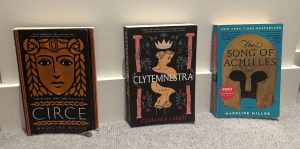Students decry textbooks that are never used
Textbooks are collecting dust on the shelves
October 6, 2017
One of the worst days of summer is when you get the letter in the mail, providing you with a list of expensive textbooks to buy for the school year. It’s not the worst day solely due to the reminder that school is starting soon but because of the shared idea among students that the textbooks won’t even be used in the class.
“I always get my textbooks before the start of school, but on the first day of my math class, the first thing my teacher announced was ‘not to buy the eBook’. I tried getting my money back but it was non-refundable,” senior Thea Riggio said.
Based on interviews, there are several instances where students buy their own textbooks with their own money in order to not bombard their parents for money. Many end up using a lot of their money from their summer job to pay for these expensive textbooks.
“Last year, I was told to buy multiple textbooks and one of them was a thick, hard-covered, physical textbook that was relatively expensive. However, I never ended up using it at all,” junior Jillian Bock said.
It is already disappointing to buy a non-refundable eBook but it may even be worse to buy a non-refundable textbook that weighs down your bag and helps create back aches.
“I purchased a $66 textbook freshmen year but ended up blowing my money because we didn’t even end up touching it. It was a complete waste and I wasn’t able to get my money back,” sophomore Devrim Tak explained.
Edutopia – an education foundation – stated that over the past five years, they have worked with urban high school AP government and environmental science teachers to figure out ways they can expand learning from actual textbooks. Edutopia observed that among all high school students in general, many students don’t ever use their textbooks because teachers often change their listed textbook for that specific course to a different electronic book.
Because New Trier requires students to purchase their own textbooks, it is a shared opinion amongst students that the amount currently charged is absurd.
On the other hand, senior Samantha D’Egidio shared an interesting loophole: “I know many of my friends, me as well, usually just end up sharing one or two textbooks to save money. I also don’t ever mind sending a couple pictures of my textbooks to my classmates in need. It’s like getting help and giving help at the same time.”
“My sophomore year, I took chemistry as my science and the required book for that course was a pretty pricey eBook but we never ended up using the book for the curriculum,” Junior Aidan Cahill said.
However, there has also been a couple instances where their teachers are loyal to their students’ textbook lists. Sophomore Tina Hong said that she knows “a lot of people that experienced this conflict but it never personally happened to me. I think it might be because I’ve only had to buy a couple hardcover textbooks but I mostly only need to buy eBooks for all my classes.”
Imagine yourself as a freshmen, ecstatic about starting your first year of high school. You have a different colored binder, labeled and ready for each class that you have, even your elective. You have your stack of textbooks that are worth at least $150 all together but little would you know, most of it would go to waste.











































